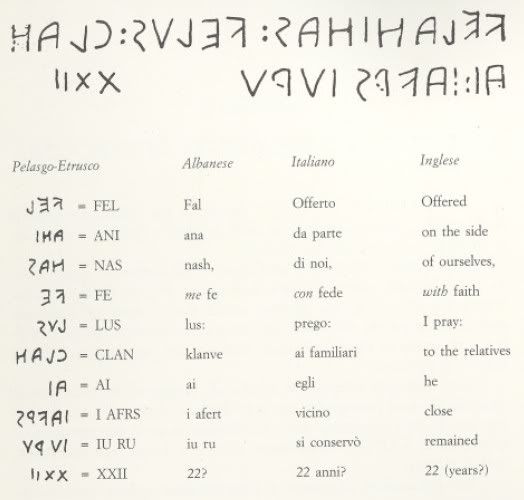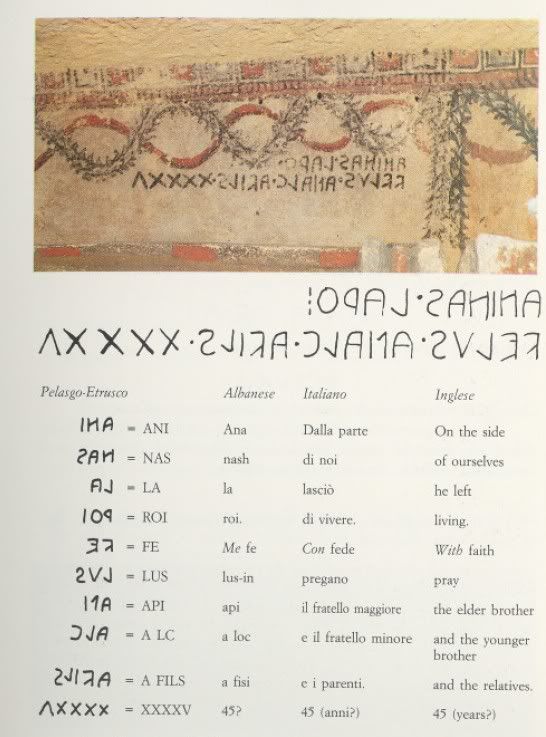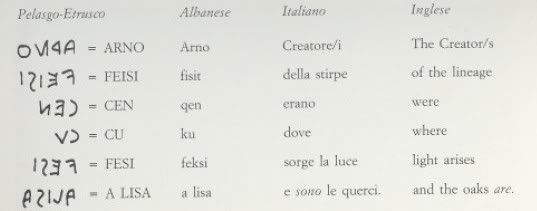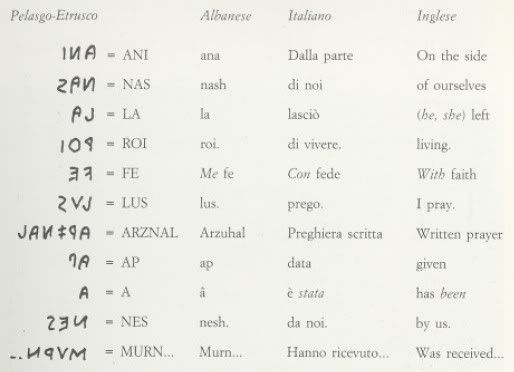


Notice: This is the official website of the All Empires History Community (Reg. 10 Feb 2002)
turks and etruscans are TRO軦N? |
Post Reply 
|
Page <1 89101112> |
| Author | ||||
Maju 
King 

Joined: 14-Jul-2005 Online Status: Offline Posts: 6565 |
 Quote Quote  Reply Reply
 Topic: turks and etruscans are TRO軦N? Topic: turks and etruscans are TRO軦N?Posted: 18-Oct-2005 at 06:52 |
|||
|
I will follow with outmost interest this linguistic discussion. But in
any case, IEs should have come from outside (or be original to Greece,
what is extremely unlikely), wether or not there are conclussive proofs
of that invasion/migration.
|
||||

NO GOD, NO MASTER! |
||||
 |
||||
Phallanx 
Chieftain 

Joined: 07-Feb-2005 Location: Greece Online Status: Offline Posts: 1283 |
 Quote Quote  Reply Reply
 Posted: 18-Oct-2005 at 05:52 Posted: 18-Oct-2005 at 05:52 |
|||
I for one would like to see how exactly can some foreign loan words constitute proof, enough proof to consider anthropologic research as false (presented before see Angel). Since when is 'bous' = ox non Hellinic and what does Mallory present? Is it the rediculous origin from the Sanskrit 'ganh' that is explained by insisting on a single unknown original word of many convenient forms that gave us all the later...??? What is exactly the origin of 'plinthos'= brick if not Hellinic and exactly what does it tell us about the words that form it, 'plassw'+ 'lithos' ? Would this mean the Hellinic language not only adopted the word but also the words that form it ??? How does this theory propose to convince us that not only did they adopt a foreign word/ name (Aphrodite) that has a clear connection to the myth of emerging from the sea, but even managed to break it down into 'aphro' and 'duth' and use those two words individually as also seen above? Of course the lands of Hellas weren't only inhabbited by Hellines and of course the Hellinic language has it's share of loans, ancient texts do tell us this quite clearly.. But it is more than obvious that in their delirium of trying to make finds of doubtable historic accuracy, these 'scholars' jump to many conclussions that aren't based on serious research.. Which in this case is presenting every non-IE word as a pre-IE adoption and thus rejecting the very existance of a language before the invisible IE invasions, which is literally unacceptale and unprovable.. |
||||
|
To the gods we mortals are all ignorant.Those old traditions from our ancestors, the ones we've had as long as time itself, no argument will ever overthrow, in spite of subtleties sharp minds invent.
|
||||
 |
||||
Sharrukin 
Chieftain 
Joined: 04-Aug-2004 Online Status: Offline Posts: 1314 |
 Quote Quote  Reply Reply
 Posted: 18-Oct-2005 at 02:00 Posted: 18-Oct-2005 at 02:00 |
|||
|
The point is that regardless of where the Pelasgians originated, Greece as part of the Levant, was still in the Levant. Besides, Homer mentions Pelasgians as inhabitants of Greece (Book 2.680) as well as inhabitants of western Anatolia (Book 2.840-844) these last being Trojan allies.
The Hyksos were colonizing the Egyptian Delta for at least a century or two before the actual "conquest".
You are assuming that cultural uniformity means linguistic uniformity as well. This may be more true for an intrusive IE cultural complex, but not necessarily so for native cultures. If we were to postulate an average original linguistic region in square miles (or square kms) we can fit from 20 to 40 different languages including PIE into the area of Europe given that studies have yielded a range of any given historical language as between 25,000 to 1 million square miles. Now, assuming that, like PIE, linguistic differentiation occurred with the other languages, we can assume many language families within Europe including Iberian, Tartessian, Euskarian, and Etruscan as among the better known historically attested non-IE languages. Even today, the only other non-IE language family which survives in Europe, Finno-Ugrian may be brought into this picture. The point is that regardless if whether Etruscans share cultural traits with the Ligurians and Iberians at such a remote period, this still does not assume that they were related linguistically. Statistically, each may represent a different non-IE language family altogether. Now, regarding the Etruscans, they can be discernable by about 900 BC with emergence of the Villanova Culture (c. 900-700 BC). The problem is that even before that, the Proto-Villanova Culture (c. 1100-900 BC) which is characterized by a uniformity of culture covering almost the entire extent of continental Italy, was in areas where known IE languages were spoken. In terms of culture therefore, either the Etruscans owned the whole length of Italy, or they adopted IE culture. The Proto-Villanova Culture is supposedly derived from the central European urnfield tradition, which is identified with IE culture. It thus becomes quite certain that the native Etruscans adopted an Italian version of IE culture. Since there is no evidence at this period of "oriental" elements entering Italy, assimilation of "Lydians" is the simplest theory to consider. In fact, when we first discern "oriental" styles in Etruscan artefacts (indeed, also in the rest of Italy) they occured only by about 750 BC.
The linguistic evidence points to more than one ethno-linguistic entity in Greece. Studies of the Greek language itself have shown that there is a substratum of words without Greek etymology. The interesting thing about this is that these non-Greek words fall into discernable categories. Greek words for Mediterranean plants such as the fig, olive, hyacinth, cypress, laurel, marjoram, chickpea, chestnut, cherry and parsnip were not originally Greek. The names of animals such as ass, the wild ox and the beetle are likewise originally non-Greek. Other words included such for metal, tin, bronze, lead, jar, pail, oil flask, sword, javelin, cornice, coping, chamber, bath tub and brick. Words for social/political concepts including basileos "king", doulos "slave", and "concubine" weren't originally Greek. Now add to this, the names of heros and divinities such as Achilles, Theseus, Athene, Aphrodite, and Hermes. We can even add to this list place-names such as Corinth, Knossos, Salamis, Larisa, Samos, and even Olympus and Mycenae. In the final analysis, the "vocabulary suggests that these borrowings were not wholly random, but rather tend to focus on words that a population intrusive into a new land might be expected to adopt from the previous inhabitants." (In Search of the Indo-Europeans, by J.P. Mallory, page 68). |
||||
 |
||||
Maju 
King 

Joined: 14-Jul-2005 Online Status: Offline Posts: 6565 |
 Quote Quote  Reply Reply
 Posted: 17-Oct-2005 at 14:55 Posted: 17-Oct-2005 at 14:55 |
|||
Could this mean that at some time Hellas was pluriethnic and ot just Greek?  |
||||

NO GOD, NO MASTER! |
||||
 |
||||
Maju 
King 

Joined: 14-Jul-2005 Online Status: Offline Posts: 6565 |
 Quote Quote  Reply Reply
 Posted: 17-Oct-2005 at 14:51 Posted: 17-Oct-2005 at 14:51 |
|||
I wouldn't say that Hiksos colonized Egypt, they rather conquered it. It's not the colonizing case of more advanced peoples on less advanced ones but rather the opposite case of less developed tribes invading a more advanced one, something that not always ends with the cultural assimilation of the invaded (examples: steppary invaders of China, Germanic invaders of Rome). But anyhow, you're right that it can be the other way... can't decide. You see: if Etruscans were native of Italy as to share with Iberians and Ligurians the Cardium Pottery Mediterranean Neolithic background, their language should be expected to be similar. Yet they don't sound the same at all (phonetically Iberian is close to Basque, sounds simmilar and uses the same type of consonants - Etruscan does not: you won't find Ps and Fs in Iberian, but you find Bs and Gs, which Etruscan doesn't have). Yet, it's known that during the Chalcolithic (pan-European chronology), Aegean/Balcanic influence does show a clear mark in southern and central Italy (Tuscany included). This could have been such an early colonization as to be considered "native" for the times we are considering. But still would imply a connection with either the Aegean or the Balcans (Rakhmani-Bubanji-Hum complex specially). |
||||

NO GOD, NO MASTER! |
||||
 |
||||
Phallanx 
Chieftain 

Joined: 07-Feb-2005 Location: Greece Online Status: Offline Posts: 1283 |
 Quote Quote  Reply Reply
 Posted: 17-Oct-2005 at 12:55 Posted: 17-Oct-2005 at 12:55 |
|||
|
Well it's not actually so much my explanation but what Alkman a pre-Socratic poet (6th cent BC) has written.
An Oxyrhynchus papyrus (number 2390) contains a quotation that mentions the above text. He stated that Thetis (she/he who sets/puts in place), was the one that put matter in order so the world was able to develop. This is totally unrelated to 'Thalassa' which derives from 'thalw' = to abound and 'alas' = salt.
Well yes but he also mentions in the exact same text, that the Peasgians were originally neighbors of those now called Dorians and settled in Thessaly. Which rather points to an 'out of Hellas' migration that to that of 'out of the Levant'.. |
||||
|
To the gods we mortals are all ignorant.Those old traditions from our ancestors, the ones we've had as long as time itself, no argument will ever overthrow, in spite of subtleties sharp minds invent.
|
||||
 |
||||
Perseas 
General 

Retired AE Moderator Joined: 14-Jan-2005 Location: Canada Online Status: Offline Posts: 781 |
 Quote Quote  Reply Reply
 Posted: 17-Oct-2005 at 12:50 Posted: 17-Oct-2005 at 12:50 |
|||
To add some infos, according to Little Iliad, Aeneas was taken as plunder together with Andromache from Neoptolemus at the return from Troy. Later he was released after the death of Neoptolemus but according to other interpretation Aeneas was released during the time of Troy's looting. According to a surmise of Hellanikos, Aeneas got away from Troy and he came by sea to Pallini of Halkidiki and then, through the country of Molossians he went to Italy where he built Rome. As a matter of fact, it was found in Halkidiki an ancient coin of 6th Century BC, portraying Aeneas. |
||||
|
A mathematician is a person who thinks that if there are supposed to be three people in a room, but five come out, then two more must enter the room in order for it to be empty.
|
||||
 |
||||
Sharrukin 
Chieftain 
Joined: 04-Aug-2004 Online Status: Offline Posts: 1314 |
 Quote Quote  Reply Reply
 Posted: 17-Oct-2005 at 11:19 Posted: 17-Oct-2005 at 11:19 |
|||
|
Like I said, colonization from the Levant to the western Mediterranean was something that is verfiable. As for colonizers vs. natives, it really depends. The Hyksos colonized Egypt, yet they did not "Hyksosized" the Egyptians. |
||||
 |
||||
Maju 
King 

Joined: 14-Jul-2005 Online Status: Offline Posts: 6565 |
 Quote Quote  Reply Reply
 Posted: 17-Oct-2005 at 11:19 Posted: 17-Oct-2005 at 11:19 |
|||
|
Nah, man! I didn't understand a word of your explanation actually but, if we're going to speculate on thalassos, I'd say it's a clear Basque word (itsaso), a word that is also origin for English sea. You know that English like to shorten words.
 But, seriously, I'd like to find out more on the Albanian connection. Much of what Albanian Trilogy posted was pretty awful but this one got me curious to find out more. The origin of Albanians themselves is misterious enough to intrigue me. |
||||

NO GOD, NO MASTER! |
||||
 |
||||
Phallanx 
Chieftain 

Joined: 07-Feb-2005 Location: Greece Online Status: Offline Posts: 1283 |
 Quote Quote  Reply Reply
 Posted: 17-Oct-2005 at 09:25 Posted: 17-Oct-2005 at 09:25 |
|||
|
Yeah I remember that one
   I just loved reading how in the next word table 'he' tried to connect 'Thetis' to 'Thalassa' without knowing the basics. LINK Had the author of this article/table ever read the Oxyrhynchus papyrus he would know what the name is all about. Alkman tells us that : ""For when matter began to be established, a certain passage (poros), like a beginning (arche), was created. Alkman says that the material of everything was confused and not made. Then, he says, there came into being he (or that, masculine) who arranged everything; then a passage came into being, and when the passage had gone past, a sign (tekmor) followed. And the passage is like an origin, and the sign is like an end. When Thetis came into being, these became the beginning and end of everything, and all things have a similar nature to that of bronze, and Thetis to that of the craftsman, and the way and the sign to the beginning and the end... on account of sun and moon not yet having come into being but matter (hyle) still being without distinction. There came about therefore ... passage and sign and darkness. Day and moon and thirdly darkness; the flashings; not merely day but with sun; first there was only darkness, after this when it was separated " So we find that 1) At the beginning matter was confused, there neither a Sun nor a Moon. So the Sidereal Cosmos as we know it was literally undeveloped. 2)Untill someone was born (Thetis) that put everything in place like a craftsman would. Thetis = from tithemi (e=hetta) which means "to set, put, place" = thetis = 'he one who places' --- I could continue with words like 'elkw', 'thera' (with an hetta), 'krounos', ....etc still in use today or others that are obviously of ancient origin.... The way I see it, it's just another propaganda attempt to introduce a noble historic background... similar to some other self proclaimed scholars that have presented a Batic origin for Homer's Troy, despite the finds that undoubtably point to the exact location... This, as a number of other attempts, be it that of Polat Kaya insisting on a Turkish origin, Georgiev and his theory , Mellart proposing an Anatolian origin, Z, Mayani (an Albanian Jew in origin citizen of France) presenting the Albanian connection (these might very well be, his tables), Gordeziani (a Georgian ) presenting an origin from Kolchis.....etc are by no means acceptable theories, which is obviously the reason that they are not accepted by the international oranizations... I guess we'll just have to wait and see... |
||||
|
To the gods we mortals are all ignorant.Those old traditions from our ancestors, the ones we've had as long as time itself, no argument will ever overthrow, in spite of subtleties sharp minds invent.
|
||||
 |
||||
Maju 
King 

Joined: 14-Jul-2005 Online Status: Offline Posts: 6565 |
 Quote Quote  Reply Reply
 Posted: 17-Oct-2005 at 08:37 Posted: 17-Oct-2005 at 08:37 |
|||
|
I'm personally inclined to believe that colonizers are more likely to
assimilate colonized ones than vice versa and I tend to think that the
Aegean->Italy migration did happen at some time probably in the
turbulent period that comprises the Sea Peoples' campaigns and the
destruction of Troy at the end of the 2nd milennium BCE.
Yet your mentions of a Balcanic connection made me recall something that was posted some time ago in a now locked post by suspended member Albanian Trilogy (copy-and-paste, copy-and-paste  ). He posted some curious transcriptions of Etruscan terms and surprising coincidences in Albanian (see http://www.allempires.com/forum/forum_posts.asp?TID=4769& ;PN=3
and scroll down till you find some pics or scanned material on that).
This has been the only locked topic I have protested about because
while AT was an autist I did want to discuss more on some of the
Albanian origins theories and particularly in the possible
Etrsuco-Albano-Pelasgian connection. ). He posted some curious transcriptions of Etruscan terms and surprising coincidences in Albanian (see http://www.allempires.com/forum/forum_posts.asp?TID=4769& ;PN=3
and scroll down till you find some pics or scanned material on that).
This has been the only locked topic I have protested about because
while AT was an autist I did want to discuss more on some of the
Albanian origins theories and particularly in the possible
Etrsuco-Albano-Pelasgian connection. Maybe this is the occasion to rescue those curious almost literal Etrusco-Albanian translations and ask Vulkan (I think he's the only Albanian member) if the translation is valid or is a far-fetched speculation. The material is the following:     Any ideas?  |
||||

NO GOD, NO MASTER! |
||||
 |
||||
Sharrukin 
Chieftain 
Joined: 04-Aug-2004 Online Status: Offline Posts: 1314 |
 Quote Quote  Reply Reply
 Posted: 17-Oct-2005 at 06:58 Posted: 17-Oct-2005 at 06:58 |
|||
|
It is not inconceivable that peoples of the Levant could colonize the western Mediterranean. The Phoenicians and the Greeks are the most verified case and point. If there was a kernel of truth to Lydians colonizing Etruria it may be probably more truthful to simply say that the Lydian element was assimilated by the Etruscans whose culture was native. Not only was Lemnian related to Etruscan but perhaps also Rhaetian. There may have been, instead a substratum of pre-IE languages of which those three languages were the remnants. Herodotus speaks of Lemnians as Pelasgians and their language related to other peoples further north in the Balkans (Book 1.57) calling them "neighbors to the Tyrrhenians". It is curious that these particular Balkan Pelasgians were called "of Tyrrhenian race" (Thucydides 4.109). Therefore instead of looking for an "Etruscan" migration perhaps it is much better to think of natives of Italy a remnant of a much larger group of linguistically related peoples of southern Europe which gained an Anatolian element. The problem with the Aeneas story of having sailed to Italy is that the earliest attestations (In Homer and Hesiod) mention no such tradition. Instead, the Homeric tradition makes Aeneas the new king of the Trojans as well as his descendants after the Sack of Troy (Illiad 20.307) (Homeric Hymns - To Aphrodite 191-198). Later, according to the Little Illiad, Aeneas was taken as a prize by Neoptolemus to Pharsalia (frag. 14). In The Sack of Troy, Aeneas simply withdraws from Troy to Mt. Ida before the Greeks took the city. Thus it is several hundred years before there is a tie-in with Romans. The Greeks know of a much older tradition independent of the "Aeneas tradition" regarding the Romans. Accordingly, the earliest tradition as known by Stesichorus (c. 600 BC) makes the founder the Rome itself a female named "Roma" who fled from Troy. Since Stesichorus was contemporary with the later Homeric tradition, the tie-in of Aeneas with Rome was of much later date, but the Trojan connection itself is quite early. |
||||
 |
||||
Maju 
King 

Joined: 14-Jul-2005 Online Status: Offline Posts: 6565 |
 Quote Quote  Reply Reply
 Posted: 16-Oct-2005 at 11:26 Posted: 16-Oct-2005 at 11:26 |
|||
Nothing actually: read the posts. |
||||

NO GOD, NO MASTER! |
||||
 |
||||
ArmenianSurvival 
Chieftain 

Joined: 11-Aug-2004 Location: United States Online Status: Offline Posts: 1460 |
 Quote Quote  Reply Reply
 Posted: 16-Oct-2005 at 06:35 Posted: 16-Oct-2005 at 06:35 |
|||
|
I havent read most of the posts on this thread, but even if Trojans migrated to Italy, what does that have to do with Turks?
There is also a theory that the Trojans migrated East after the Trojan war, setting up shop in the Caucasus and giving steam to what would become the Armenian culture. Its only a theory, though, but i have heard it from some historians. I dont buy into that stuff, myself. Edited by ArmenianSurvival |
||||
|
Mass Murderers Agree: Gun Control Works!
http://en.wikipedia.org/wiki/Van_Resistance 諗斋展 榨斩謩 闸铡盏謥 諃铡盏 榨斩謩謮 |
||||
 |
||||
Maju 
King 

Joined: 14-Jul-2005 Online Status: Offline Posts: 6565 |
 Quote Quote  Reply Reply
 Posted: 16-Oct-2005 at 06:34 Posted: 16-Oct-2005 at 06:34 |
|||
|
I'm sure that Virgil's Aeneid was created largely out of his
imagination, yet the ultimate source for the legend is older
(Apollodorus lived one century before him and Ovid's references are
also often considered to have older lost backgrounds). Virgil also
recycled some Greco-Italian mythological items to build up his stuff.
And, as I said before, you still have other 5 points to consider. I would never build a theory only on mythological materials. |
||||

NO GOD, NO MASTER! |
||||
 |
||||
SearchAndDestroy 
Caliph 
Joined: 15-Aug-2004 Location: United States Online Status: Offline Posts: 2728 |
 Quote Quote  Reply Reply
 Posted: 15-Oct-2005 at 20:46 Posted: 15-Oct-2005 at 20:46 |
|||
|
Thats what my book of Mythology says, it was written by Virgil, but was ment to give the Romans a hero. heres what the book says-
Honestly I don't think this story can be held accountable as historical. It was just a tale to amuse the populace and give a sense of pride.If the Trojans did manage to come over, I doubt it had anything to do with them knowing about it and just took the character from the Greek poem and added more on him. |
||||
|
"A patriot must always be ready to defend his country against his government." E.Abbey

|
||||
 |
||||
Maju 
King 

Joined: 14-Jul-2005 Online Status: Offline Posts: 6565 |
 Quote Quote  Reply Reply
 Posted: 15-Oct-2005 at 18:10 Posted: 15-Oct-2005 at 18:10 |
|||
|
Even if you're right in that, you still have 51/2 points left to think about.
Now, on the legend of Aeneas, we have the first part, which is from the Iliad, that clearly states that Aeneas and his family escaped helped by Poseidon, as Aeneas was predestined to become king of the Trojan people. Then, the second part, which is the association of Aeneas to Italy (and specifically to Rome) doesn't seem to be just an invention of Virgil (not of Augustus in any case) but actually was dwindling in the imaginary of the incipient Greco-Roman civilization from before. At least Apollodorus seems to refer to that connection, and so does Ovid. Anyhow, Virgil himself was a non-Roman Italian born near the Etruscan city of Mantua. Maybe from that he gets his fascination for Aeneas and his connection to Italy. It could well be an old Etruscan asociation that was transfered to Rome. At least there's more room to speculate than just attributing the major literary work of the Aeneid to a political decision from Augustus. Augustus pushed for the work to be published even if unfinished, with all its literary defects like the vulgar pluralization with -s, etc., but he didn't decide to write it and much less added a single word to it. It was Virgil's work, his unfinished work of 10 years. |
||||

NO GOD, NO MASTER! |
||||
 |
||||
SearchAndDestroy 
Caliph 
Joined: 15-Aug-2004 Location: United States Online Status: Offline Posts: 2728 |
 Quote Quote  Reply Reply
 Posted: 15-Oct-2005 at 17:25 Posted: 15-Oct-2005 at 17:25 |
|||
|
The Legend of Aeneas is just that, a legend. Augustus had it written to give the Romans a better identity and by the book I have was written for the new era of the empire to create a national hero for "the race destined to hold the world beneath its rule". So back then they were going on much of anything except political propaganda when Augustus had ended a civil war, turned around a bankrupt empire, and had a period of peace. The whole legend seems far fetched, when the Trojans landed and founded Rome they had also stole the women of a neighboring people. In all actualality the Romans were probably just a small village of native people that grew from farmers to the citizens of a empire. |
||||
|
"A patriot must always be ready to defend his country against his government." E.Abbey

|
||||
 |
||||
Maju 
King 

Joined: 14-Jul-2005 Online Status: Offline Posts: 6565 |
 Quote Quote  Reply Reply
 Posted: 15-Oct-2005 at 16:00 Posted: 15-Oct-2005 at 16:00 |
|||
|
It's understood that, first, Troy wasn't just the city but also the
surrounding region (Troade) and that they had many allies (some of
which would probably be ethnically akin), and, second, that they could
have migrated prior to the destruction of the city. Regarding the first
point there's a whole legend of Aeneas, who supposedly survived
(outside the city) and founded Rome. Arfunda also noted that there are
other legends regarding other Anatolian peoples migrating to Italy.
Anyhow, if you read the article, it doesn't talk of Troyans as such but Anatolians. They could be Luwians or Hittites or Lycians or Mysians or Carians... ... actually the Anatolian "parentage" is just a reference, they could well be from other nearby regions with simmilar genetics, like Greece. The scope for the actual meaning of the study is wide enough for us to speculate in the hope that further archaeological findings or comprehensive studies give a better light to the issue. By the moment we have that:
Btw, I'm not sure that Armenians have much relation with Hittites. They are rather said to have been Phrygian colonists. Lydians were Hittite speakers. |
||||

NO GOD, NO MASTER! |
||||
 |
||||
SearchAndDestroy 
Caliph 
Joined: 15-Aug-2004 Location: United States Online Status: Offline Posts: 2728 |
 Quote Quote  Reply Reply
 Posted: 15-Oct-2005 at 13:44 Posted: 15-Oct-2005 at 13:44 |
|||
|
We are talking over three thousand years. If your talking about the Trojan citizens of Troy, and if the legend of the city is true that they were pretty much wiped out from the Greeks, then I doubt there genetic lineage would have lived on, especially if they mixed. It's like with a cousin, you share 50% of your genetic code with them, by 2nd cousin about 25%, but 4th cousin your basicly not even family anymore. After Troy fell if there were survivors my guess is they'd be a hand full and any group coming in would basicly just wash there identity away because it's no more a isolated population so to speak. But you can find the the group of people that made up the Trojans. If they were Hitittes, wouldn't the Armenians have a better chance of being the decendents, as Hititites are the ancestors of the Armenians right? This is just a question here, nothing I can really claim as being true or even possible.
|
||||
|
"A patriot must always be ready to defend his country against his government." E.Abbey

|
||||
 |
||||
Post Reply 
|
Page <1 89101112> |
| Forum Jump | Forum Permissions  You cannot post new topics in this forum You cannot reply to topics in this forum You cannot delete your posts in this forum You cannot edit your posts in this forum You cannot create polls in this forum You cannot vote in polls in this forum |
Copyright ©2001-2009 Web Wiz
This page was generated in 0.113 seconds.












 Printable Version
Printable Version Google
Google Delicious
Delicious Digg
Digg StumbleUpon
StumbleUpon Windows Live
Windows Live Yahoo Bookmarks
Yahoo Bookmarks reddit
reddit Facebook
Facebook MySpace
MySpace Newsvine
Newsvine Furl
Furl Topic Options
Topic Options